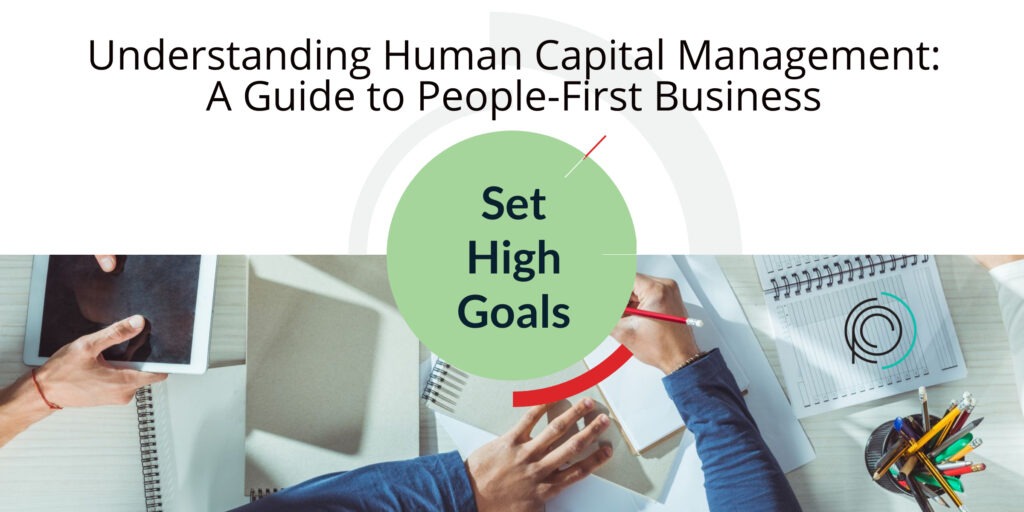Human capital, the bedrock of any thriving organization, encapsulates the collective expertise, abilities, competencies, and the yet-to-be-realized potential residing within its workforce. This unparalleled asset stands at the forefront of driving innovation, boosting productivity, and steering the comprehensive growth trajectory of a company. By excelling in human capital management (HCM), organizations not only see an uptick in performance metrics but also cultivate an environment ripe for continuous improvement and robust employee engagement.
Despite its undebatable significance, the nuanced management of human capital often doesn’t receive the recognition it deserves within strategic business planning. This oversight can lead to missed opportunities in nurturing a workforce that is aligned with the company’s long-term vision and goals.
This article aims to peel back the layers of HCM, illuminating its critical role in sculpting the future landscape of organizations. By diving deeper into the essence of human capital management, it seeks to arm readers with a comprehensive understanding of the concept, highlighting why it is indispensable and how it can serve as a catalyst for propelling your organization to unprecedented levels of performance and growth. Through practical strategies and insights, this discussion is designed to guide leaders and managers on how to effectively leverage HCM, transforming their human resources into a powerhouse of innovation and a cornerstone for sustainable success.
Defining Human Capital Management (HCM)
Human Capital Management (HCM) is the strategic approach to managing a company’s most valuable asset – its human resources. This comprehensive process encompasses several key functions, including the recruitment of new talent, the development and training of existing employees, and the important task of retaining skilled staff members. By directing focus towards the [retention of employees](https://cpcchangeagent.com/post/employee-attrition-of-30-or-more-how-to-prepare-to-work-with-a-consultant/), companies address one of the most challenging aspects of human resources management.
Furthermore, HCM involves managing employee benefits, overseeing payroll operations, and ensuring employees have a healthy work-life balance. This holistic approach provides an extensive framework for managing the workforce not just as a group of employees but as individuals with unique needs and potential for growth.
By focusing on the cultivation of employee talent and skills, businesses can significantly enhance employee productivity. This, in turn, leads to lower attrition rates as employees feel more valued and connected to their workplace. Moreover, an effective HCM strategy can improve a company’s profitability by aligning employee performance with the organization’s overarching goals and objectives.
In essence, Human Capital Management is about creating an environment where employees can thrive and contribute to business growth, fostering a culture of continuous improvement and innovation. Through a combination of strategic planning and thoughtful management practices, businesses can unlock the full potential of their human capital to drive success.
The Importance of HCM
Effective HCM is essential for organizations to stay competitive in the market. While numerous traditional companies prioritize tangible assets like processes, products, or machinery as the core elements of their business model, contemporary enterprises understand that human capital stands as their most invaluable asset.
Exceptional Human Capital Management (HCM) necessitates the careful crafting of a workplace environment that is not only supportive and productive but also deeply empathetic. This environment should celebrate diversity at every turn, fostering an atmosphere where creativity is not just welcomed but actively encouraged, and innovation can thrive. Achieving this involves more than simply acknowledging the unique contributions of each team member. It requires the implementation of comprehensive programs and meticulously designed policies that actively promote aspects critical to employee welfare—such as their well-being, professional growth, and overall job satisfaction.
By investing resources and time into HCM, organizations achieve much more than mere compliance with industry best practices. They embark on a transformative journey to cultivate a workplace culture that deeply values every individual, making them feel truly appreciated and empowered to contribute their best work. This culture serves as the foundation for building a workforce that is not only highly engaged and motivated but also exceptionally productive. Employees, when they feel valued and see opportunities for personal growth, are more likely to be committed to their roles and the success of the company. This, in turn, equips the organization with a robust team capable of navigating challenges, seizing opportunities, and driving the company toward its strategic goals with unparalleled determination and efficiency.
Benefits of Human Capital Management (HCM)
Businesses that prioritize human capital management (HCM) enjoy a multitude of benefits that contribute to their success and growth. Implementing effective HCM practices and strategies allows organizations to develop a strong employer brand, which in turn attracts and retains top talent. This is crucial in today’s competitive job market where skilled professionals have plenty of options.
A well-managed HCM practice not only helps in building a positive employer reputation but also results in a workforce that is satisfied, motivated, and highly productive. Employees who feel valued and are provided with opportunities for professional development are more likely to stay committed to their employer and deliver excellent results. This is evidenced by the positive correlation between effective HCM practices and reduced employee turnover rates, as highlighted in various studies, including insights from https://cpcchangeagent.com/post/the-cost-of-high-churn/.
Moreover, by offering comprehensive training and development programs, organizations can ensure that their employees are well-equipped to meet the challenges of their roles, leading to increased job satisfaction and higher retention rates. These programs can range from technical skill enhancement to leadership and management training, catering to the diverse needs of the workforce.
Effective HCM also plays a critical role in ensuring that organizations comply with legal and regulatory requirements. Staying abreast of changes in employment law and implementing policies that meet these standards is essential for minimizing risk and fostering a safe and healthy work environment.
In essence, investing in HCM is investing in the future of the organization. By focusing on the development and well-being of their employees, businesses can build a strong, agile workforce that is capable of driving growth and adapting to the ever-changing business landscape
Implementing HCM
To prioritize Human Capital Management (HCM), organizations must undertake specific, targeted steps. Begin by cultivating a workplace culture that places high value on employees’ contributions and fosters an environment of open and transparent communication with all team members. This involves not only recognizing their work but also actively listening to their feedback and ideas.
Next, conduct a thorough assessment of the current HCM practices to determine their effectiveness and efficiency. This evaluation should cover all areas, including recruitment, onboarding, employee development, performance management, and retention strategies. Identify areas for improvement and develop a strategic plan to address these gaps.
Develop comprehensive employee development programs, offering training and learning opportunities tailored to individual and organizational needs. This could include professional development workshops, online courses, mentorship programs, and career advancement paths, all aimed at enhancing employees’ skills, knowledge, and overall productivity.
Finally, invest in advanced technologies and tools that automate and streamline HCM processes. This could include software for HR information systems, performance management systems, and employee self-service portals. Automating these processes not only reduces the time and resources spent on administrative tasks but also improves the accuracy and accessibility of employee data, making it easier for HR professionals to make informed decisions.
Future of Human Capital Management
Human Capital Management (HCM) is evolving at an unprecedented pace, profoundly influenced by rapid advancements in technology, significant shifts in demographics, and ever-changing regulatory environments. As we venture further into the digital age, emerging technologies like Artificial Intelligence (AI), Machine Learning, and comprehensive data analytics are becoming indispensable tools for organizations. These technologies enable businesses to meticulously track and analyze HR metrics, providing invaluable insights into employee engagement, productivity, and attrition rates.
In this dynamic landscape, it’s crucial for organizations to stay abreast of the developments shaping the HCM horizon. Adapting to these changes is not just about adopting new technologies but also about rethinking strategies to enhance employee experiences, foster a culture of continuous learning, and develop leadership that can navigate through the complexities of the modern workplace. By doing so, organizations can not only meet the current demands of managing a diverse and evolving workforce but also anticipate future needs, ensuring sustainability and success in the long term.
Human capital management (HCM) stands at the forefront of priorities for achieving organizational success in today’s rapidly evolving business landscape. In the face of a highly competitive market, the escalating challenges of the business environment, and pronounced talent shortages, the importance of nurturing human capital has intensified. It is no longer just an operational necessity; it has become a strategic imperative.
Companies that adopt a people-first strategy, implementing it in a thoughtful and strategic manner, position themselves to build robust, long-lasting competitive advantages. This approach involves more than just recognizing the value of their workforce; it entails a comprehensive commitment to developing, engaging, and retaining talent. By cultivating an environment that fosters professional growth, encourages engagement, and rewards innovation, businesses can unlock the full potential of their employees.
Harnessing the potential of a highly engaged, motivated, and skilled workforce is critical. Such a workforce can drive not just incremental improvements but substantial organizational growth, success, and profitability. A company’s ability to innovate, adapt to market changes, and deliver exceptional customer experiences hinges on the strength and vitality of its human capital.
In the quest to leverage human capital for maximum impact, businesses face numerous challenges and opportunities. Designing and implementing effective HCM strategies requires a nuanced understanding of workforce dynamics, a commitment to diversity and inclusion, and an unwavering focus on employee well-being.
If you’re looking to elevate your company’s human capital management and harness the full potential of your workforce, we’re here to help. Book some time with one of our consultants to discuss how HCM can be a catalyst for your business’s success. Explore how strategic investment in your people can propel your organization to new heights of performance and profitability.







